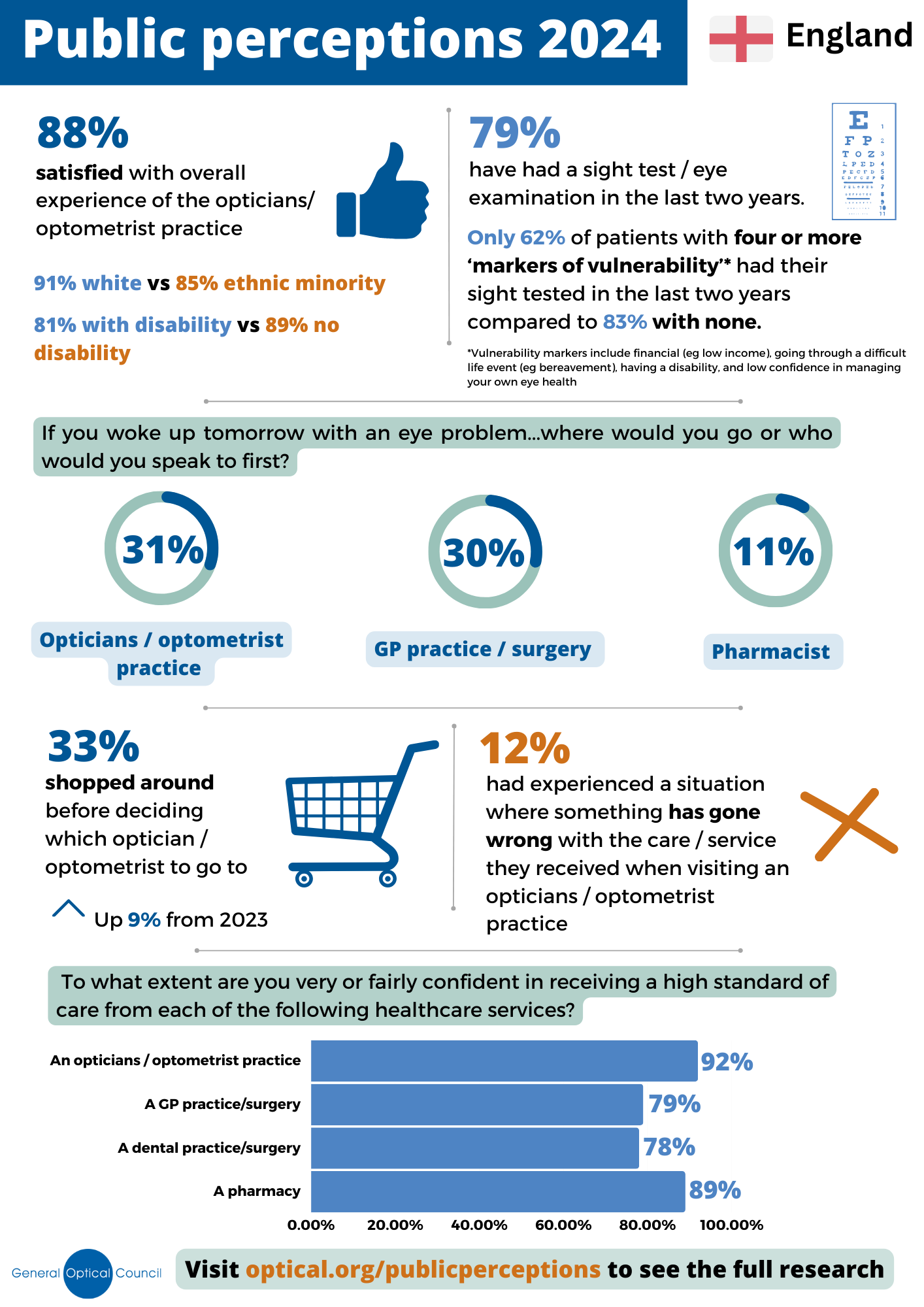GOC public perceptions research 2024

Research survey findings for England
The General Optical Council (GOC) has published its 2024 public perceptions research, which shows that 92 per cent of respondents were satisfied with the optometrist who carried out their sight test/eye examination, and that 88 per cent were satisfied with their overall visit.
“It is encouraging to see that public confidence in the services of High Street practices remains high, reflecting the hard work undertaken by primary eyecare clinicians despite continued under-investment in general ophthalmic services,” commented Max Halford, ABDO clinical lead.
Figures in the survey also showed that only 33 per cent of respondents would attend an opticians/optometrist practice instead of their GP or hospital – down slightly from 36 per cent in 2023.
Those living in England were less likely to turn to an opticians/optometrist practice first compared to all other nations. Those in Wales (43 per cent), Scotland (44 per cent), and Northern Ireland (41 per cent) were more likely than those in England (31 per cent) to say they would go to an opticians/optometrist practice first if they had an eye problem.
“High quality patient care is at the heart of our members’ work,” said Max, “and it is concerning that only one third of patients would consider going to an optical practice in the event of problems. Clearly, the funding of services plays a large part in this – and it is notable that where national governments had commissioned enhanced services, uptake at optical practices was higher.
“We will continue to press the new Labour government to address this issue in England. However, we must continue to play our part in getting the message out to patients that High Street opticians are highly trained, well equipped and easy to access.”
“There are some areas of research where we need to look more closely,” Max continued. “These include survey respondents from an ethnic minority background being less satisfied with their overall visit than white participants [84:91 per cent], and those with a disability being less satisfied with their overall visit compared to those without a disability [82:89 per cent].
“Also concerning is the finding that only 63 per cent of patients with four or more ‘markers of vulnerability’ had had their sight tested in the last two years, compared to 82 per cent with none. These patients were also less satisfied with their overall visit, compared to those with no markers of vulnerability [77:94 per cent].”
The survey also revealed that 31 per cent of respondents were shopping around before selecting which opticians/optometrist practice attend – significantly higher than 2023’s figure of 21 per cent.
Of those who purchased spectacles following their sight test/eye examination, 78 per cent purchased them from the opticians/optometrist practice where they had their sight test/eye examination, down from 85 per cent in 2023. The number of survey respondents going on to buy their spectacles from ‘supermarkets, High Street stores, or the internet’ has risen from five per cent in 2023 to 14 per cent in 2024.
Commenting on the survey result, Steve Brooker, GOC director of regulatory strategy, said: “While pleasing that public satisfaction and trust levels remain high overall, it’s worrying that experience of eyecare can vary considerably based on someone’s background and life circumstances. We know registrants want to give all patients the best possible care and the sector needs to work collaboratively to reduce the inequalities revealed by our survey.
“We will aim to reduce inequalities through our corporate strategy for 2025-30, which includes an objective to create fairer and more inclusive eyecare services. Further, we are strengthening our standards of practice to improve care for patients in vulnerable circumstances. And we will be commissioning new research into the lived experiences of different patients to bring these survey findings to life,” Steve added.
Read the survey results in full.